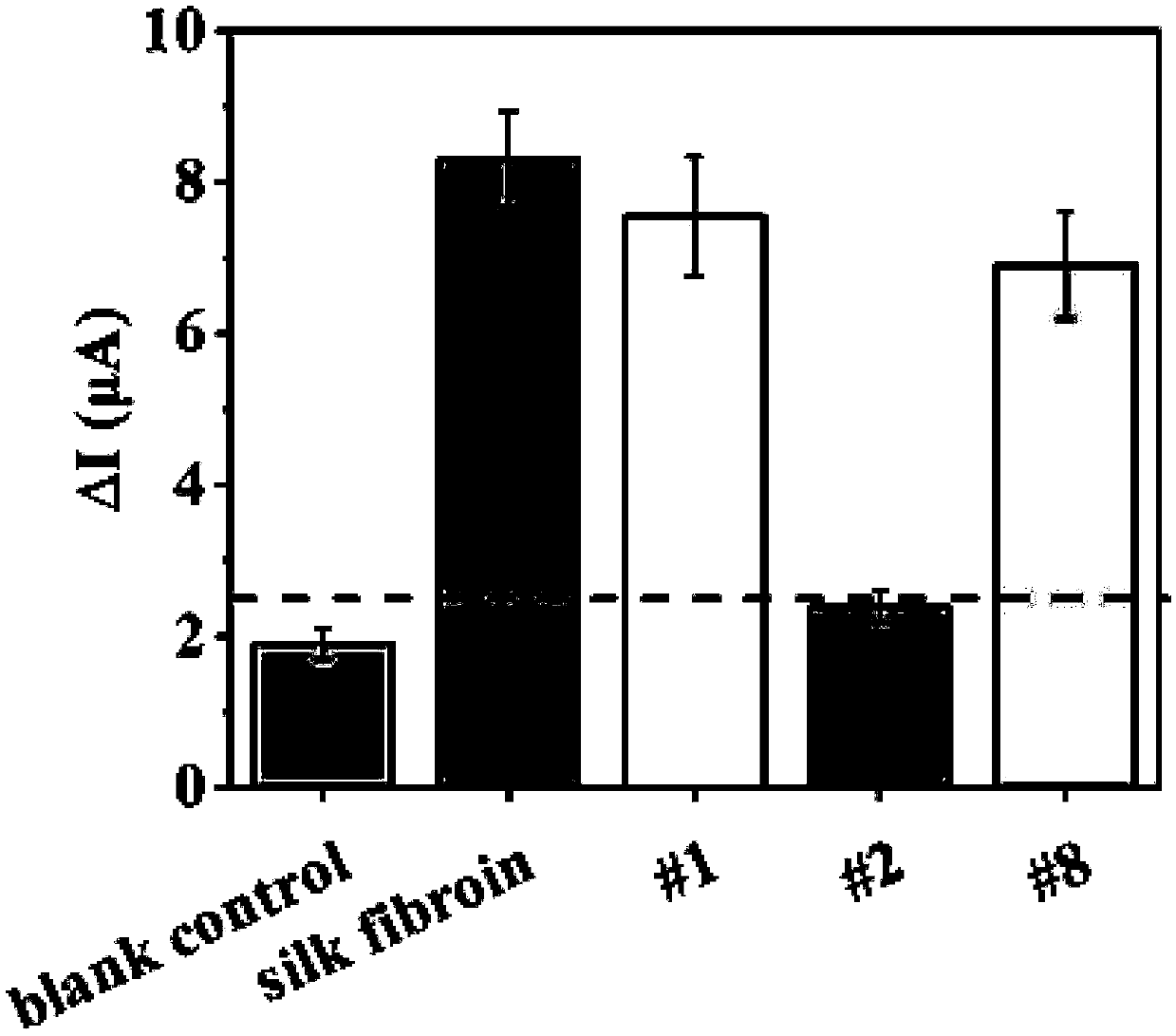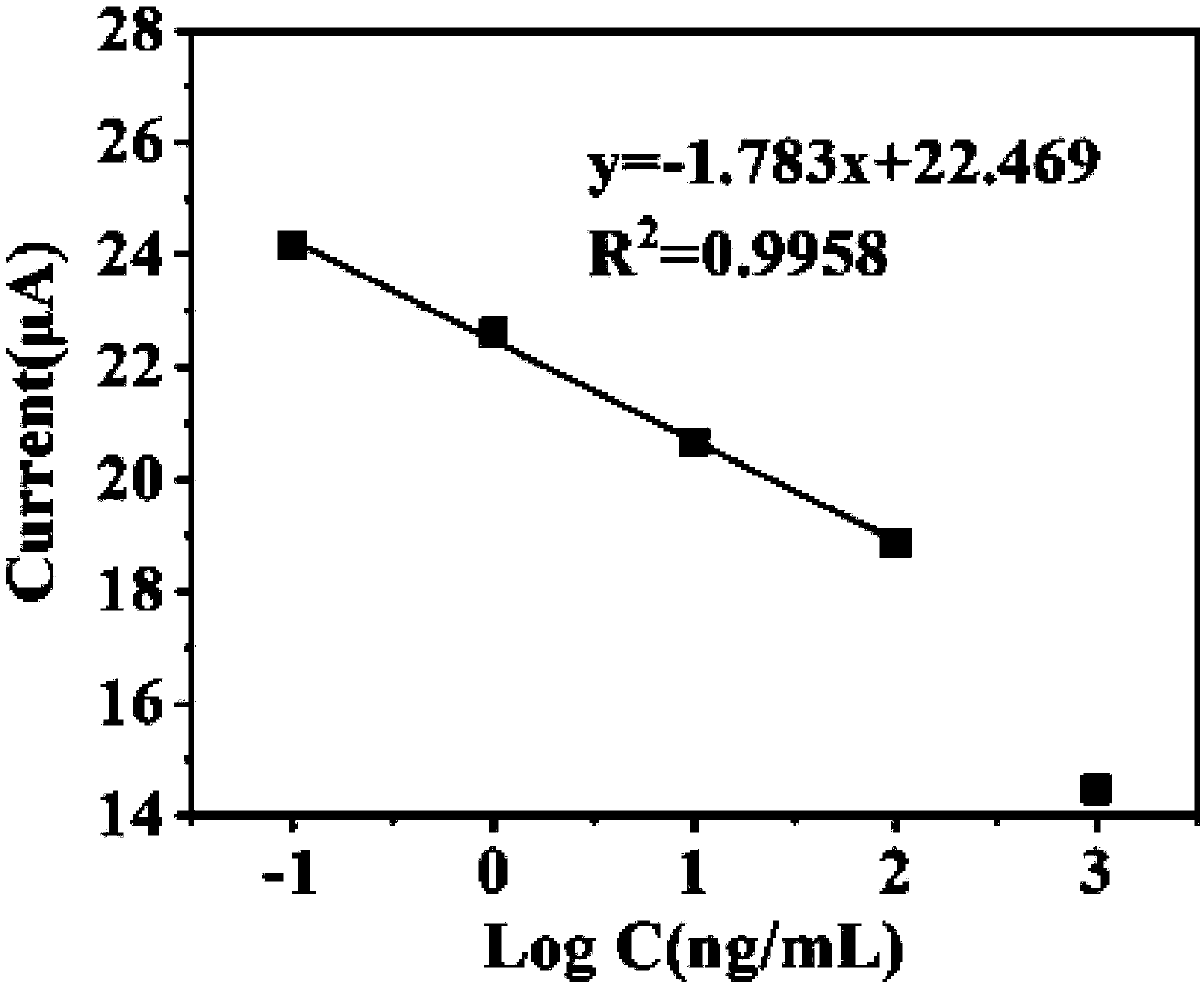High sensitivity detection method for silk cultural relic
A high-sensitivity, detection-method technology, applied in measuring devices, instruments, and material analysis through electromagnetic means, can solve problems such as the difficulty of detecting cultural relics with extremely low silk fibroin content, and achieve high binding rate and utilization efficiency High, large specific surface area effect
- Summary
- Abstract
- Description
- Claims
- Application Information
AI Technical Summary
Problems solved by technology
Method used
Image
Examples
Embodiment 1
[0040] A) Take 5g silkworm cocoons, cut them open with scissors, take out the silkworm chrysalis inside, and remove the innermost chrysalis lining. The obtained cocoon shells were weighed and added with a mass fraction of 0.4% Na 2 CO 3 For the degumming solution, stir for 0.5h at a bath ratio of 1:45 and a temperature of 98°C, and repeat this operation twice to fully remove sericin. The insoluble silk fibroin was washed five times with deionized water, and placed in an oven at 55 °C to dry overnight, and reserved for future use.
[0041] B) Add the dried silk fibroin to the protein extract solution (the molar ratio of calcium chloride: water: ethanol is 1:8:2), stir and dissolve for 1.5 h at a bath ratio of 1:45 and a temperature of 98 °C . After cooling and filtering the extract containing silk fibroin at room temperature, dialyze in deionized water with a cellulose dialysis bag with a molecular weight cut-off of 10,000 to remove calcium ions and chloride ions, and change...
Embodiment 2
[0055] A) Take 5g silkworm cocoons, cut them open with scissors, take out the silkworm chrysalis inside, and remove the innermost chrysalis lining. Weigh the obtained cocoon shells and add 0.5% Na by mass fraction 2 CO 3 For the degumming solution, stir for 0.5h at a bath ratio of 1:50 and a temperature of 99°C, and repeat this operation twice to fully remove sericin. The insoluble silk fibroin was washed five times with deionized water, and placed in an oven at 60 °C to dry overnight, and reserved for future use.
[0056] B) Add the dried silk fibroin to the protein extract (the molar ratio of calcium chloride: water: ethanol is 1:8:2), stir and dissolve for 2 h at a bath ratio of 1:50 and a temperature of 99 °C . After cooling and filtering the extract containing silk fibroin at room temperature, dialyze in deionized water with a cellulose dialysis bag with a molecular weight cut-off of 10,000 to remove calcium ions and chloride ions, and change the water every 4 h, 72 h ...
Embodiment 3
[0068] A) Take 5g silkworm cocoons, cut them open with scissors, take out the silkworm chrysalis inside, and remove the innermost chrysalis lining. Weigh the cocoon shells obtained and add 0.6% Na by mass fraction 2 CO 3 The degumming solution was stirred for 0.5h at a bath ratio of 1:55 and a temperature of 100°C, and this operation was repeated twice to fully remove sericin. The insoluble silk fibroin was washed five times with deionized water, and placed in an oven at 55-65°C to dry overnight, and reserved for future use.
[0069] B) Add the dried silk fibroin to the protein extract (the molar ratio of calcium chloride: water: ethanol is 1:8:2), stir and dissolve for 2.5 h at a bath ratio of 1:55 and a temperature of 100 °C . After cooling and filtering the extract containing silk fibroin at room temperature, dialyze in deionized water with a cellulose dialysis bag with a molecular weight cut-off of 10,000 to remove calcium ions and chloride ions, and change the water ev...
PUM
 Login to View More
Login to View More Abstract
Description
Claims
Application Information
 Login to View More
Login to View More - R&D
- Intellectual Property
- Life Sciences
- Materials
- Tech Scout
- Unparalleled Data Quality
- Higher Quality Content
- 60% Fewer Hallucinations
Browse by: Latest US Patents, China's latest patents, Technical Efficacy Thesaurus, Application Domain, Technology Topic, Popular Technical Reports.
© 2025 PatSnap. All rights reserved.Legal|Privacy policy|Modern Slavery Act Transparency Statement|Sitemap|About US| Contact US: help@patsnap.com


